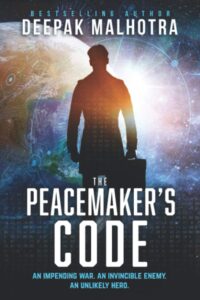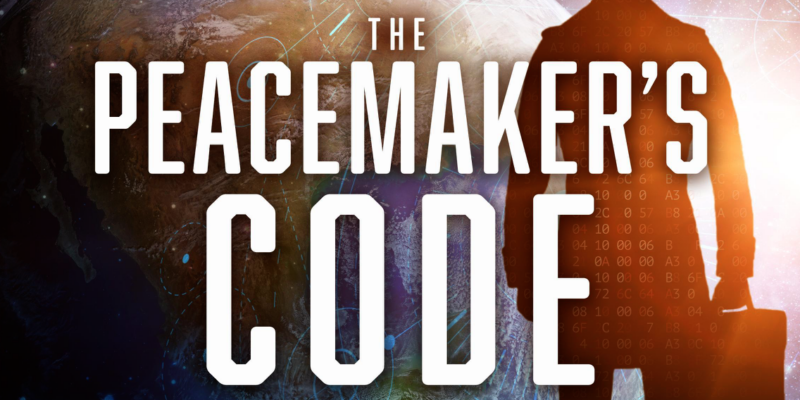List of Must-Read Books for Every Negotiator
Let me introduce you to my new project. I would like to put together a list of five books every negotiator must-read. And when doing this, I do not have in mind works directly related to negotiation and/or mediation such as Getting to Yes by Roger D. Fisher a William Ury and Mediation Process by Christopher W. Moore. My goal is to direct your attention to books seemingly unrelated to conflict resolution. Some of them will be even from a completely different genre. What connects them together is the fact they include some messages and inspiration relevant to negotiation and conflict resolution. Naturally, it will be completely based on personal preference. In non-subsequent posts, I will be gradually filling the list. Actually, I had started a couple of years ago when I blogged on The Man Who Planted Trees.
Today, I want to write about an excellent novel The Peacemaker’s Code by Deepak Malhotra.
Harvard University Professor

Now to give you a glimpse of the story, I will briefly summarize the plot. When doing so, I will try to evade all spoilers, yet if you want to be completely surprised, skip the following paragraph. Even if you go through the summary, you will not be short of surprises for everything will be different and completely twisted at the end of the day.
— — — Beginning of Possible Spoilers Zone — — —
D. Kilmer is a renowned professor of history and diplomacy. We meet him as he is invited by the CIA to give a consultancy service on a situation that is very much threatening the existence of our world. Yes, the Earth is approached by Aliens and it pretty much looks like they want to destroy it… or at least mankind dwelling on it. Unlike in many Hollywood movies, they seem to be much better equipped than any human army at hand and – in general – the Aliens’ knowledge and technical advancement seem to be on a completely different level. As pointed out in the book, this sour conclusion is not a huge surprise given the fact all the spaceships have travelled millions of kilometres to reach our planet. To make a long story short, any military encounter would probably turn into a complete disaster with truly epic consequences for mankind. To make the situation worse, the human side is far from being united and thus, the only hope is… to negotiate.
— — — End of Possible Spoilers Zone — — —
Every Problem Wants to Be Solved

Source: Wikipedia Commons
If you opted for the more focused approach, you will be well rewarded. I have selected a couple of examples of those enlightenments. One to start with is the big picture mantra professor Kilmer follows up throughout the whole story: Every problem wants to be solved. Professor reminds himself of this rule anytime he encounters troubles or deadlock. This already is a great mindset for every negotiation and a great lesson learned.
To comply with this golden rule, professor Kilmer deals with presumptions and perceptions accordingly. It is quite refreshing that the main character happens to not know what to do from time to time. At any stage, he is keeping a tight grip on the situation as illustrated by the following quote:
I am not sure yet. I need to think about it some more and I want to hear from everyone in the meeting. I do not mind making a call with too little information, but I do mind making it with less than I can get.
Ice-braking of Applied Theory
The book is full of casual examples of applied negotiation theory. For instance, Deepak Malhotra is using the scene when professor Kilmer is meeting with US President Marianne J. Whitman for the first time to masterly illustrate the art of small talk and ice breaking.
[The vice-president Zach] Nielsen suggested that they sit. President Whitman looked around at the options.
‘There is no way I am digging through those pillows to find a few inches of coach, Zach. I will take one of the chairs.’
Nielsen’s reactions suggested that this was an ongoing joke between the two of them. Kilmer resisted the urge to laugh. The President took Nielsen’s chair and the VP switched over to one of the couches. Whitman was about to reach for some coffee when she noticed that all three cups had already been used.
‘Seriously Zach? No cup for me?’
Kilmer froze. There had never been an extra cup – I’m an idiot.
Nielsen came to the rescue: ‘I’m sorry about that madam president. My mistake we’ll get another one right away, along with some more hot coffee.’ He gave Kilmer a nod that seems to say: ‘Don’t worry Prof, I’ll cover for you.’
Kilmer smiled back thanks. Then with a grin on his face, Nielsen continued: ‘As you can see madam President, I ordered three cups but professor Kilmer felt that he deserved at least two of them for coming all this way to help us. I think it shows courage actually. Not too many people would have the guts to steal a cup from the person who has access to our nuclear launch codes.’
What the hell? Thanks for nothing Zach. Kilmer tried to think of something witty to say. He came up with: ‘Sorry about that…’
Whitman laughed: ‘Zach! Be nice! It’s okay Professor. If you can help us get out of this mess I’ll gladly send you every piece of China in the White House. I even throw in some of Nielsen’s pillows. She gave Kilmer a pat on the shoulder as if to make it clear that she was taking his side and that she was not in the least bit offended. Kilmer found a bit of footing.
‘I’m happy to take on the aliens Madam President, but asking me to take these pillows of your hands is little much.’
‘Et tu, professor?’, said Nielsen as Whitman laughed. Nielsen looked over at Kilmer and gave him a wink. That’s when Kilmer realised that Nielsen had actually done him a favour by throwing him under the bus. It had broken the ice and engendered a more informal atmosphere. Nielsen had even managed to get president Whitman to come to Kilmer’s defence. It was a small gesture on her part and entirely in jest, but it created a moment of camaraderie. A basis for rapport between Whitman and Kilmer that would otherwise have taken much longer to build.
The Heirs of Herodotus

Source: Wikipedia
The Heirs of Herodotus, by D. Kilmer, excerpt from Chapter 1: ‘Society cannot afford to forget the lessons of the past, nor to learn the wrong lessons. But there is a third danger and it is the greatest threat of all. If only because it is the least well recognised. Humanity can no longer afford to have only a handful of its citizens of leaders understand the lessons of history. We cannot count on a select few to be the caretakers of knowledge. The elite guardians of wisdom will be rendered useless if the masses are incapable of understanding their language and able to appreciate their concerns or uninterested even in considering their advice.’
Those words prove to be more up-to-date than it seems at the first sight. And they point us to another problem in the dispute resolution field. Are we capable of providing the general public with enough understandable explanations why to negotiate and mediate their conflicts? This is a real challenge to be tackled. Deepak Malhotra supplies us with a way to go – to illustrate the principles of consensual negotiation using different tools that may reach the broader public.
One of many reflections upon finishing the book was whether Deepak Malhotra will actually finish The Heirs of Herodotus. I think it would be worth the effort. On a cheerful note, he would have to use the pseudonym of D. Kilmer. Anyway, I would like to thank him for this wonderful book for another reason too. Since 2017, I have been typewriting a crime fiction set in old Prague. Page by page in spared time. I always considered that as a kind of hobby or even therapy after mediating difficult cases. After finishing The Peacemaker’s Code, I decided to give it another look and publish it. Of course, I will let you know about the progress.
Must-Read Books for Every Negotiator
Have you read The Peacemaker’s Code: Let me know your thoughts in the comments. Also, what would be your 5 Every Negotiator Must-Read Books?
________________________
To make sure you do not miss out on regular updates from the Kluwer Mediation Blog, please subscribe here.



